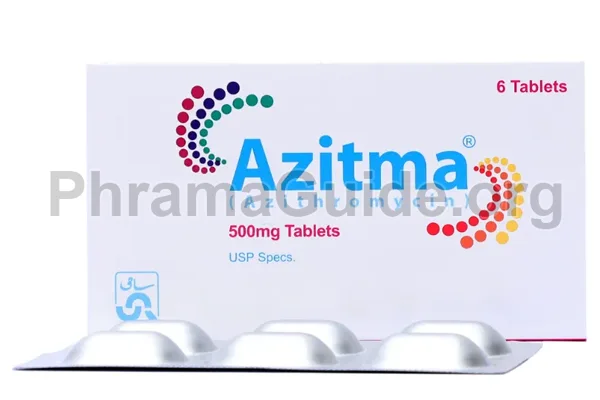Azitma tablet is a broad-spectrum antibiotic medication that is primarily used to treat a variety of bacterial infections. Following are some common uses of Azitma Tablet:
- Respiratory Tract Infections: Azitma tablet is commonly used to treat respiratory tract infections such as pneumonia, bronchitis, and sinusitis.
- Gastrointestinal Infections: Azitma tablets can be used to treat gastrointestinal infections caused by susceptible bacteria, including travelers’ diarrhea and gastroenteritis.
- Skin and Soft Tissue Infections: Azitma tablets are used to treat skin and soft tissue infections such as cellulitis and impetigo.
- Sexually Transmitted Infections: Azitma tablets can also be used to treat certain sexually transmitted infections such as chlamydia and gonorrhea.
- Ear Infections: Azitma tablets can be used to treat ear infections such as otitis media.
- Traveler’s Diarrhea: Azitma tablets may be used to treat traveler’s diarrhea, which is caused by bacterial infections acquired during travel to certain regions.
- Mycobacterium Avium Complex (MAC) Infections: Azitma tablets can be used to prevent and treat infections caused by the MAC bacteria in patients with HIV.
Off-label Uses of Azitma Tablet
- Acne: Azitma tablet has been used off-label to treat acne, particularly inflammatory acne.
- Lyme Disease: Azitma tablets are used in combination with other antibiotics to treat Lyme disease, which is caused by the bacterium Borrelia burgdorferi.
- Mycoplasma Infections: Azitma tablets may be used to treat infections caused by Mycoplasma bacteria, including walking pneumonia.
- Periodontitis: Azitma tablets can be used as an adjunct to scaling and root planing in the treatment of periodontitis, a type of gum disease.
- Pelvic Inflammatory Disease (PID): Azitma tablets have been used in combination with other antibiotics to treat PID, which is an infection of the female reproductive organs.
- Conjunctivitis and Trachoma: Azitma tablet is sometimes used for the treatment of conjunctivitis (pink eye) and trachoma (a bacterial infection) that affects the eyes and can cause blindness.

What is Azitma?
Azitma is one of the leading brands of Azithromycin, manufactured and marketed by Sami Pharmaceuticals, Pakistan.
Azitma Alternatives : Other Similar Brands
The following are some alternative brands of Azitma and their manufacturers.
- Azomax : Novartis, Pakistan.
- Zetro : Getz Pharmaceuticals, Pakistan.
- Macrobac : Asian Continental Pharmaceuticals, Pakistan.
- Zyto : High-Q Pharmaceuticals (Pvt) Ltd, Pakistan.
- Azotek : Saffron Pharmaceuticals, Pakistan.
- Zezot : Bosch Pharmaceuticals, Pakistan.
- Zithromax : Pfizer Pharmaceuticals.
- Atizor : Macter International.
- Exthro : Indus Pharmaceuticals, Pakistan.
- Azitral : Nova Med Pharmaceuticals, Pakistan.
- Rescue : Standpharm Pakistan (Pvt) Ltd.
Azitma : Available Formulations and Strengths
Presently, Azitma is available in Tablets, Suspension, and Injection forms
Azitma Tablets : 250mg, and 500mg strengths
Azitma Suspension : 200mg/5ml strength
Azitma Injecction : 500mg/5ml strength
Who Should Not Use Azitma?
There are some important contraindications that should be considered before using Azitma tablet.
Hypersensitivity: Azitma should not be used in patients with known hypersensitivity to Azitma, erythromycin, or any macrolide antibiotic.
QT Prolongation: Azitma should be used with caution in patients with a history of QT prolongation, or in those taking medications that can cause QT prolongation.
Liver Disease: Azitma should be used with caution in patients with liver disease, as it can cause liver damage or worsen existing liver problems.
Kidney Disease: Azitma should be used with caution in patients with kidney disease, as it can accumulate in the body and cause further damage.
Myasthenia Gravis: Azitma should be used with caution in patients with myasthenia gravis, a condition that causes muscle weakness and fatigue.
Pregnancy and Breastfeeding: Azitma should only be used during pregnancy or breastfeeding if it is absolutely necessary, as it can pass through breast milk and harm the baby.
What is the Recommended Daily Dosage of Azitma?
AZITMA Tablets and Oral Suspension can be used with or without food.
Azitma maximum daily dose, for adults and children above 12 years, is 1000-1500mg.
Adults Dose:
For all indications, the usual adult dose is 500mg as a single dose in 24 hours for 3 days
Sexually transmitted Disease: 1000mg/day as a single dose
Conjunctivitis and trachoma: 1000mg single dose or once weekly for up to 3 weeks
Treatment of community-acquired pneumonia: 500mg/day for 1 week.
Treatment of pelvic inflammatory disease: 250mg/day for 7 days
Children Dose:
Azitma dose in children is 10mg/kg of body weight in 24 hours for 3 days.
Conjunctivitis and trachoma: 20mg/kg of body weight once a week and therapy for three weeks.
Streptococcal pharyngitis and tonsillitis: 20mg/kg of the body weight in 24 hours and therapy for 3 days consecutively.
Acute Otitis Media: 10mg/kg of the body weight in 24 hours and therapy for 3 days
Acute Bacterial Sinusitis: 10mg/kg of body weight in 24 hours for 3 days.
Community-Acquired Pneumonia: 10mg/kg of body weight in 24 hours for 5 days.
How Azitma Works?
Azitma belongs to the macrolide family of antibiotics and works by preventing bacteria from making proteins that are essential for their growth and survival. It inhibits the process of protein synthesis in bacteria by binding to the 23s RNA of the bacteria 50s ribosomal subunits.
Related Links:

Leave A Comment